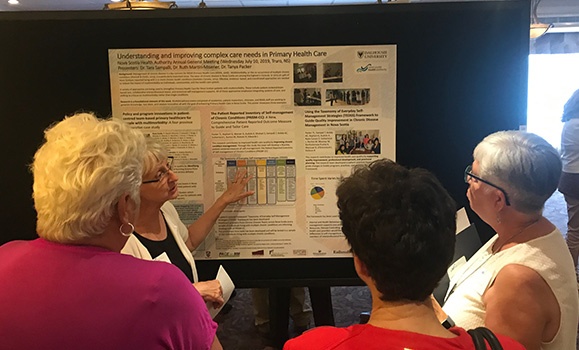News
» Go to news mainDal Health researchers collaborate with NSHA to improve the lives of those with chronic conditions

Dr. Ruth Martin-Misener (Director, School of Nursing) and Dr. Tanya Packer (Director, School of Health Administration) were recently invited to present their work with primary care at the Nova Scotia Health Authority’s Annual General Meeting in Truro. ĚýDrs. Martin-Misener and Packer are working in collaboration with the Primary Care and Chronic Disease Portfolio at NHSA.
They are part theĚýInternational Chronic and Complex Condition Research Group (IC3RG)Ěýteam and . IC3RG is aĚýteamĚýof researchers, PhD students, health providers and patients hoping to change the everyday lives of people with chronic conditions.ĚýBRIC-NS isĚýpart of a cross-CanadaĚýresearch network that seeks to improve primary health care and integrated services for people with—or at risk of developing—complex health care needs
Dr. Packer is one of the Principal Investigators of IC3RG. By interviewing people living with chronic conditions, her team have identified seven different types of strategies people use to live well with a chronic condition. This patient-centred lens is now being used by many of the NSHA chronic disease, diabetes and family practice teams to assess whether they are providing the support patients need to manage the everyday tasks of living with their conditions. Also under development is a patient-reported outcome measure, testing of interventions to reduce fatigue associated with chronic conditions and how technology can change the lives of people with vision loss and blindness. Ěý
Dr. Martin-Misener leads a research team comprised of academics, patient researchers, health providers, and decision-makers from Nova Scotia, Newfoundland and Labrador, Ontario and Quebec. Together, this team is studying innovative approaches collaborative primary health care teams use to provide services for persons living with multiple chronic health conditions. By comparing innovative programs in four provinces, the team will learn what innovative programs exist, how they were developed and implemented, and how patients experience them. This information will support development of new, ground-breaking programs for persons with multiple chronic conditions. Ultimately, this project will improve health by making it easier for collaborative primary health care teamsĚý to deliver high-quality programs and supports for their patients.
Recent News
- Dr. OmiSoore Dryden’s appointment to the School of Nursing
- How welcoming is Canada?
- STAFF SNAPSHOT: Andrew Pelrine, Manager of Alumni Engagement and Donor Relations
- Nursing students support local community in population health promotion project
- Bridging continents: Dal students to learn, share and connect in West Africa
- Partnership between UpLift and Public Health sees continued funding allocated for Youth Engagement Coordinators
- Dal Health grad students use podcasting to discover the people behind the science
- Nursing student closer to living out her dream of helping people thanks to support of new award
